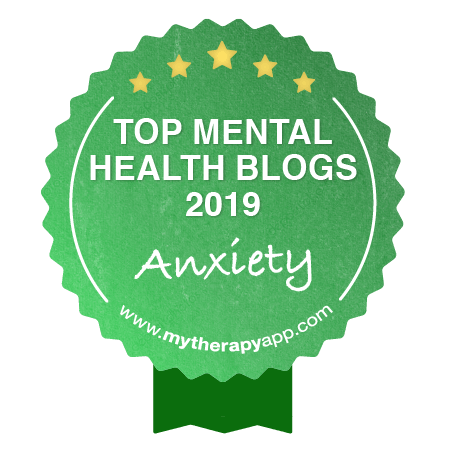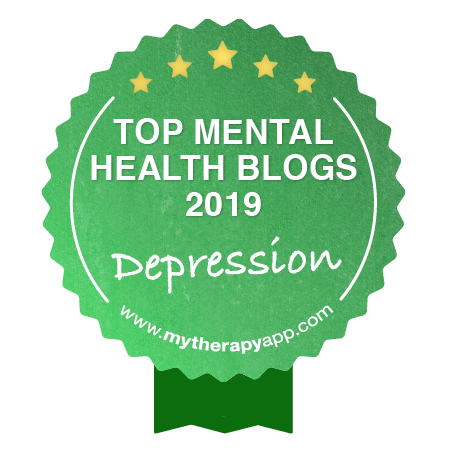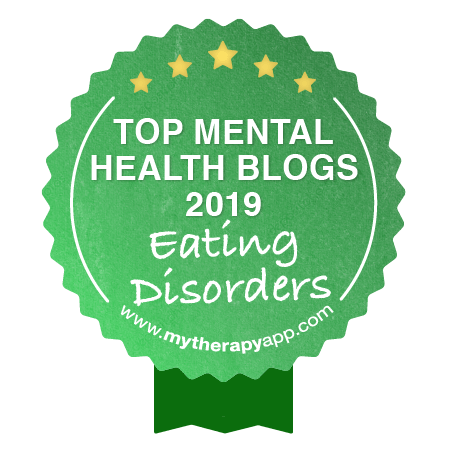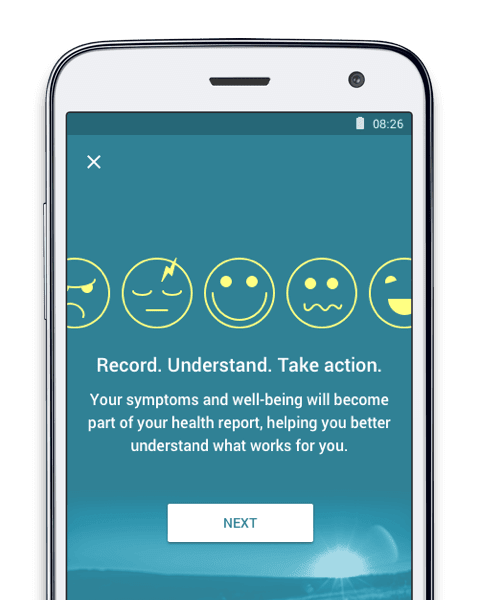These mental health bloggers help form an online community that has grown over the years, offering support, advice, and empathy for millions of people around the world living with mental health conditions. While the internet is often criticized for its effect on mental wellbeing, these bloggers go some way to redress the balance and demonstrate the positive power of the web.
Top Mental Health Blogs for Anxiety

There are a range of conditions that fall under the umbrella of anxiety disorders. Nearly 40 million people in the US experience an anxiety disorder in any given year, making them the most prevalent form of mental illness.
‘Anxiety’ is an umbrella term for several different conditions (including PDST and OCD – which you can read about below) that, combined, are the most common form of mental illness. Generalized anxiety disorder (GAD) is characterized by “persistent and excessive worry about a number of different things.”
Although over 3% of the US population are believed to live with GAD, less than half are receiving treatment.
Top 3 Blogs for Anxiety:
We’re All Mad Here
Claire Eastham has been writing her blog, We’re All Mad Here, for five years in an attempt to help people realize that social anxiety is more common than many believe. The name of the blog was also used as the title for her book, published in 2016, that acts as a “no nonsense guide to living with social anxiety.”
Both her blog and book provide a thoroughly well-written and personal account of life with social anxiety and panic attacks, doing so with liberal smatterings of humor and wit.
The success of her blog has resulted not only in a best-selling book, but it has been a launchpad for Claire’s work as a public speaker and mental health advocate. Aside from her blog, Claire’s writing can be found across the web, while she has made plenty of appearances on TV and radio.
The Butterfly Mother
The Butterfly Mother, Laura Clark, began her blog in 2015 having suffered from what she describes as “severe and devastating” post-natal depression and anxiety following the birth of her son.
Not surprisingly, The Butterfly Mother’s primary audience is mothers and mothers-to-be, but her writing encapsulates the symptoms of anxiety with which so many people will be familiar. This is in no small part thanks to her wonderful writing ability that, in combination with her openness, makes her able to pen moving and emotive content.
Laura also calls on her experiences to offer pearls of wisdom to those who encounter similar difficulties to those she has faced.
Her son, whom she whimsically refers to as Caterpillar, will become a brother later this year. The growth of Laura’s family will no doubt be reflected in the evolution of her blog.
Other posts you may be interested in on the MyTherapy blog:
Anxiety Sisters
Maggie Sarachek and Abbe Greenberg, aka Mags and Abs, are sisters in all but the biological sense of the word, having met as undergraduates at the University of Pennsylvania nearly three decades ago.
Although the two experience different symptoms and triggers, both have lived with anxiety for as long as they have known each other and have been at each other’s sides as they have gradually got to grips with the condition and found effective treatment.
Anxiety Sisters started as a small community in 2011, the growth of which led to the creation of the website and blog two years ago. It was done so with the aim of using their shared experiences to provide help and support for others. It now includes a podcast called The Spin Cycle with the Anxiety Sisters, which case be found on iTunes and Spotify.
The blog features writing not only by Maggie and Abbe, but also contributions from a number of guest bloggers. Aside from the blog, there is also a section reserved for a range of resources, provided by both the sisters themselves and external sources.
“Our goal is and has always been to demystify and de-stigmatize the experience of anxiety (and other mental health disorders) through shared experience and thorough research.
“We answer every single question we get by email and on social media and strive to provide responsible and accurate information to our community (membership is currently around 75 thousand) in a non-judgmental and often humorous way.”
– Megs & Abs
Top Mental Health Blogs for Depression

Over 16 million people in the US will have experienced a major depressive episode in the last year. For many people it is a daily battle.
The online community that people living with depression have developed offers a space for people to share their experiences, advice, and support with one another.
Top 3 Blogs for Depression:
Depression Marathon
etta has featured on previous iterations of our blogger compilations, and her writing is still going strong with 2019 in full swing.
She was diagnosed with depression 18 years ago and has been writing her blog for over a decade. Given the longevity of her blog and the candid nature of her writing, the topics etta has discussed on her blog are varied and insightful.
Subjects range from her experience with ketamine infusion therapy in 2017 to a recent trip to Nepal, and pretty much anything in between.
This is the third consecutive year we have recommended Depression Marathon, which is a testament to the continued quality and effectiveness of etta’s writing.
“I began Depression Marathon as a result of the stigma and the misinformation I faced early in my battle with depression.”
– etta
Depression Warrior
Upon visiting her website, the first thing you learn about Depression Warrior, Laura Becker, is that she has lived with major depressive disorder (MDD) and anxiety for over three decades, was diagnosed with borderline personality disorder 20 years ago, and is recovering from addiction.
The matter-of-fact manner in which she presents this information on her homepage hints at Laura’s willingness to be frank and direct when discussing any topic relating to mental health, which she has done so since starting the blog in 2017.
She tackles issues such as suicide and addiction, as well as her experiences with treatments such as dialectical behavior therapy (DBT) and transcranial magnetic stimulation (TMS). Her writing regarding the latter may be of interest to anyone wanting to understand TMS and how it differs from electroconvulsive therapy (ECT).
Depression Warrior provides a gritty insight into the reality of living with depression and other mental health conditions, no matter how challenging the topics discussed may be.
Radical Transformation Project
Faith Mariah unknowingly lived with depression for years before receiving treatment and has since dived head-first into the world of self-help. Her website, Radical Transformation Project, is a place where she reflects on her experiences and shares what she has learned with others.
Aside from the blog, Faith has a wealth of materials designed to help those living with depression and anxiety. While her website is largely designed for women, many of the topics discussed – such as alcohol, fitness, and school – transcend gender and can prove useful to anybody living with depression.
Faith has also lived with anxiety for much of her life and discusses it along with depression, while sections dedicated to self-help, her podcast, and online resources make it a comprehensive website for people – and women in particular – living with depression and other mental health conditions.
For more of the best blogs about depression, check out Depression: 10 of the Best Blogs in 2018
Top Mental Health Blogs for Eating Disorders

Eating disorders such as anorexia nervosa, bulimia nervosa, and binge eating disorder are estimated to affect up to 30 million people in the US.
Top 3 Blogs for Eating Disorders:
I Haven’t Shaved in 6 Weeks
In 2014, then-24-year-old Lindsey Hall began a six-week spell in rehab.
The entire time is documented in a remarkable and raw series of posts that Lindsey describes as the rehab edition of Netflix’s Orange is the New Black. The Truth: 1-9 posts are the best place to start for those new to her blog, the name of which is inspired by her time in the actual facility (as razors were forbidden).
Since then, she has continued to write about her ongoing recovery with a similar lack of sugar-coating. Whether writing about relationships, alcohol, exercise, or any other subject that arises, Lindsey addresses it with a writing style that is both blunt and engaging.
In her ‘about me’ page, Lindsey explains that when searching for information about the realities of life in rehab, she found nothing but “a list of emotionless rehab blog posts, clinical articles, eating disorder ‘signs and symptoms,’ and inspirational quotes.”
Her motivation for starting I Haven’t Shaved in 6 Weeks was to counteract such blogs with one that shares the transparent “nitty gritty” – an ambition she is most certainly fulfiling.
Eating Disorder Hope
Eating Disorder Hope is the brainchild of Jacquelyn Ekern, a licensed therapist who specializes in eating disorders and who has recovered from one herself.
Since its foundation in 2005, the website has grown to be one of the most comprehensive on the web for resources relating to eating disorders.
When it comes to the blog, entries are frequent and cover a diverse range of topics. The posts are often written by experts in the field and are always well-researched, including citations to studies and articles for further reading.
By 2013 Eating Disorder Hope was firmly establishes as a respected destination for support, advice, and education regarding eating disorders. In that year Jacquelyn launched a sister site, Addiction Hope, acknowledging that individuals often live with concurrent addition disorders.
AKKR ED Recovery Care
The author of AKKR gives little away regarding her identity; there is no ‘about me’ page or any form of bio, and the only hint of a name is given in the form of the letters ‘AK,’ with which she refers to herself.
Nonetheless, lack of identity should not be confused with lack of personality. Quite the opposite, in fact, as AK’s experiences of living with anorexia are delivered with beautiful poise.
The traditional element of the blog can be found under the heading ‘Journaling Through Recovery.’ AK started her blog at the beginning of 2018, and in the year that has passed has journaled candidly about the highs and lows of recovery, how it impacts daily life, and the very nature of anorexia.
Aside from the journaling section of the blog, AK also reserves an area of her site for ‘Versing Through Recovery,’ where she delivers her thoughts and emotions in a poetic and artistic manner. Finally, posted in ‘Letters Through Recovery’ are two letters, one to a friend of AK and another to her body.
AK’s blog manages to capture the very essence of her personality and some of her innermost emotions, despite revealing little about the details of her life, making it a fascinating and insightful read.
“With a lot of writing done during recovery, starting the blog was a way to share chronicles of my personal experience, in hope of connecting with, and supporting others in their own journey towards the freedom to live a meaningful and full life.
“As someone who lacked awareness about eating disorders, and who was never really exposed to a treatment community, I had an incredibly hard time making sense of my feelings or understanding why I was no longer able to relate to my entourage.
“For this reason, I thought that sharing my journey could be a useful resource, allowing those who find themselves in the depth of a poorly understood illness feel heard and empathized with.
“I feel delighted that my platform is recognized as a resource for those living with eating disorders and I look forward to seeing (and journaling on) what this new year of recovery holds.”
– AK
Of course, the information, advice and support offered in these blogs should never act as a substitute for professional help. However, the online community that has been build by those living with mental health conditions is quite extraordinary, with blogs such as these ones being one of the key components.
Take a look at some of the other posts on the MyTherapy blog:
- Social Media & Suicide: Spot the Signs and Support a Loved One in Need
- ‘The Heartbreak of Psoriasis’ and Its Effect on Mental Health
Are you taking antidepressant medications? You can learn about some of the most common one here:
- Trazodone: Your Most Common Questions Answered
- Venlafaxine <span>(</span>Effexor<span>)</span>: Your Most Common Questions Answered
- Living with Citalopram: Your Questions Answered
- Living with Fluoxetine: Your Questions Answered
- Living with Sertraline: Your Questions Answered
- Living with Amitriptyline: Your Questions Answered



